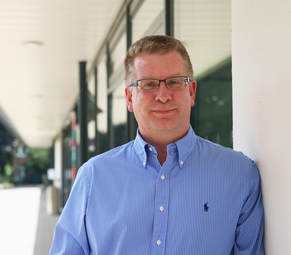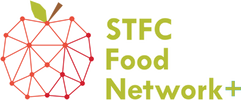 From rocket launchers to rocket salads, Geraint Morgan (based at The Open University) is always on the lookout for a challenge – and the SFN were happy to oblige! Cancer detection, sports anti-doping, luxury fragrances, submarine air monitoring and space missions: Geraint’s work has embraced a staggering array of fields. The common thread linking them all is his expertise in Gas Chromatography-Mass Spectrometry (GC-MS): a sophisticated technique for separating and identifying the different chemical compounds in samples. As Geraint explains; “Everything produces a unique smell- a distinct profile of volatile organic compounds”. Having trained as an analytical chemist, Geraint’s research career started by investigating how GC-MS ‘fingerprints’ of stable isotopes could model global sources of methane and their respective roles in climate change. He then turned his attention from Earth’s systems to more distant realms, joining the teams behind two space missions. The first of these concerned the Rosetta Lander, Philae, and resulted in a miniature GC-MS system called Ptolemy which successfully analysed the chemical composition of the comet Philae landed on. Later, Geraint developed a similar system for the Mars Lander Beagle 2 to analyse rock samples for organic samples indicative of past life. Sadly, communication was lost with Beagle 2 after it landed, however the missions gave Geraint a suite of capabilities and a network of contacts ideal for problem solving back on Earth. “Having a planetary science background gives you a diverse skill set, besides the experience of working as part of a multidisciplinary team including chemists, physicists, mechanical and software engineers, geologists and microbiologists” he says. Looking for a new challenge, he attended an SFN workshop at Rothamsted Research recommended to him by Stephen Serjeant, the SFN Champion for STFC Technology. Here he found no end of potential avenues for his specialist expertise. “My first SFN workshop alone resulted in two successful projects, besides half a dozen potential new partnerships in a range of areas from chickens to blackfly larvae to Scotch whisky” he says. Both these projects address one of the biggest challenges in the food retail sector: food waste. According to the UK waste advisory body WRAP, 1,200,000 tonnes of fresh fruit and vegetables are needlessly wasted each year. At the workshop Geraint and his colleague Simon Sheridan met Hilary Rogers (Cardiff University) and in turn her colleague, Carsten Müller, who were working on reducing waste from bagged rocket salads. Using GC-MS technology, they had already demonstrated that cut leaves have a distinct molecular fingerprint that can be used to predict shelf life. However, this required expensive, bulky laboratory equipment: the challenge now was to develop a portable device that could be easily used throughout the value chain. Geraint and’s Simon work on the space missions proved ideal training: “The space community is very good at thinking outside the box and making things that are small, robust, built to survive and that don’t require a mains plug!” he says. Having demonstrated proof of principle for the device, they are now at the stage of considering applying for follow-on investment funding. The second project concerns the avocado industry, growing at a phenomenal rate but with a high level of associated waste. “Although they may look fine on the surface, one in five avocados develops disorders in the flesh, for instance browning and/or fungal decay, causing most people to throw them straight into the bin” says Geraint. Working with Marcin Glowacz, (Natural Resources Institute/University of Greenwich) Geraint and his colleague Simona Nicoara are developing a system to non-invasively ‘sniff out’ these blemished beauties at importers and ripeners, i.e. before they are sent to the retailers. Currently they are trapping organic compounds released by avocados then analysing them with GC-MS to see if there is a distinct fingerprint that can differentiate browned specimens. As with the rocket salad, the challenge will then be to develop this into a tool that can be easily used by the supply chain. “Ultimately, we aim to enable importers in the UK to ensure that only good quality avocados enter the UK fresh produce market, while transferring the poor-quality fruit into other industries, so that they can be converted to other products, such as oil.” Rather than slowing down, Geraint’s workload only seems to accelerate and expand into new fields. One of his latest projects is a medical diagnostic device to detect the bacteria that cause stomach cancer, one of the biggest killers in India. “It’s amazing to think that the same analysis methods we performed to look for signs of life on Mars are now being used to potentially save millions of lives here on Earth– a nice legacy from the mission”. Having made quite a leap from space missions, Geraint recognises the role that networks played in making this lateral move: “These networks such as the SFN function very well in bringing different people together so we can see how our technologies could potentially offer a new solution for the community. I get such a thrill from tailoring a new product to be exactly the right thing for the end user”. No doubt it won’t be long before he is ‘sniffing out’ the next challenge! (With thanks to Caroline Wood, University of Sheffield author of this blog post)
0 Comments
|
AuthorJune 2024 - Archives
June 2024
Categories |
- Home
- Webinars and Events
- About the SFN+
- News
- Blog
- Expert Working Groups
- Funding
-
Publications
- Bioeconomy positioning paper
- SFN+ 5th Annual Conference
- OMM Policy Report
- ‘Multi-Stakeholder International One Day Workshop on Organic Agri-Food Value Chains for Net Zero’ Report
- SFN 2050 UK Net Zero Food report
- Sustainable Cold Food Chain Booklet
- Food Sensing Technologies for Safe and Nutritious Food
- Sustainable urban and vertical farming
- Projects
- Join/Contact Us

 RSS Feed
RSS Feed


